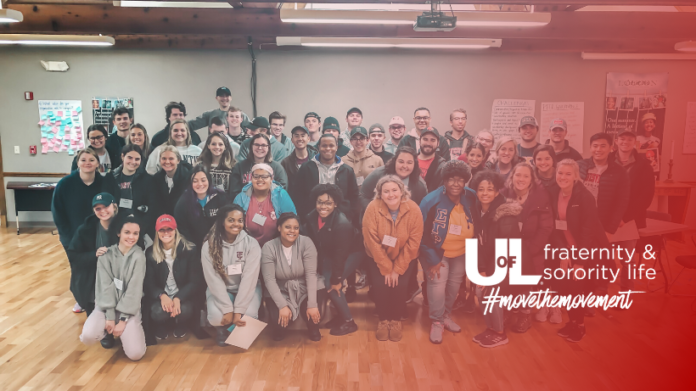From singing their hearts out at Fryberger to dancing the night away at raiseRed, from chapter meetings to Founder’s Day, UofL alumni who are members of fraternities and sororities have fond memories of their time on campus.
This year, there was extra reason to be nostalgic. UofL is celebrating 100 years since the first fraternities were officially recognized, introducing Greek life to campus. Alumni and current students honored the date at a Fraternity and Sorority Life Centennial Celebration during Homecoming week.
Since the first fraternities were recognized by campus in 1921, UofL added sororities in 1922 and in 1959 the first Black Greek organizations moved to UofL after being chartered originally at Louisville Municipal College. Organizations throughout the years have included social, honor, service and professional groups.
Today, 33 fraternities and sororities make up Greek life at UofL. Joining more than just social clubs, students who are members of fraternities and sororities gain experience in leadership, community service and academic excellence, while helping the university make strides toward inclusivity.
“Greek life definitely influenced who I became and helped to shape the work I do,” said Tomarra Adams ’96, ’97, now the dean of undergraduate education at Spalding University. “The ability to lead did not solely begin in my membership in Alpha Kappa Alpha and our work through the National Pan-Hellenic Council (NPHC), but it was nurtured, challenged and elevated.”
SHAPING UNDERGRADUATE YEARS
Students who are part of the Greek community often cite cultivating identity, leadership opportunities, networking and academic achievements as being valuable for their future endeavors on and off campus.
“My undergraduate Greek experience gave me an education that I couldn’t get in the classroom,” said William “Bill” Brasch ’71, a Phi Kappa Tau member who went on to be a national president of the fraternity. “It enabled me to really learn how to learn. It enabled me to expand my understanding of networking and, most importantly, my sphere of friendships.”
It also helps students uncover who they are. “Greek life at UofL gives women and men the opportunity to rediscover the identity that high school drained us of,” said Emily Kuhlman, a Sigma Kappa Sorority member and College Panhellenic Council vice president. “I lacked self-awareness, motivation and confidence in my own identity. I quickly learned when becoming immersed into Greek life that it’s cool to be unconditionally authentic.”
Like Adams, many current and former Greek organization members point to leadership skills as a main benefit of their involvement.
“Greek life has benefited me in several ways but the most prominent way has been through leadership,” said Seryn Bentley, a member of Alpha Kappa Alpha Sorority Inc. and NPHC president. “I’ve also gained connections with campus officials through events, meetings and correspondence.”
While many may think of Greek life as a social endeavor, participation has been proven to boost academics. According to statistics provided by Kate Roessler, assistant director for fraternity and sorority life, students involved in Greek life are 15.3% more likely to persist after the first year of college than non-Greek students. Fraternity and sorority members are also 25.5% more likely to graduate within six years.
“Greek life has a direct correlation with first-year retention rates, four-year graduation rates, GPA and a better overall experience at UofL,” said Brendan Kolbinsky, a member of Pi Kappa Alpha Fraternity and Interfraternity Council president. “It gives access to a network of support academically, personally, socially and professionally.”




















